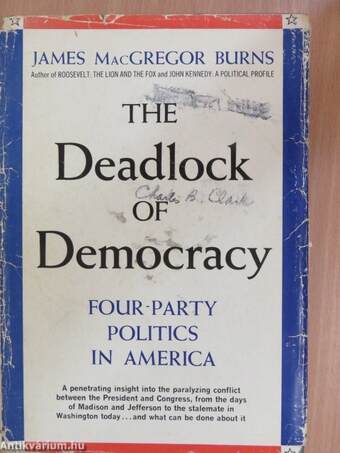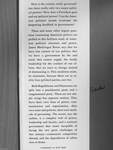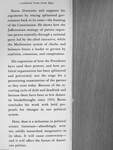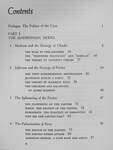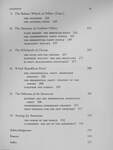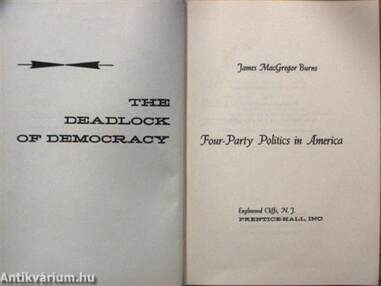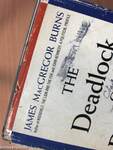1.067.327
kiadvánnyal nyújtjuk Magyarország legnagyobb antikvár könyv-kínálatát

VISSZA
A TETEJÉRE
JAVASLATOKÉszre-
vételek
The Deadlock of Democracy
Four-Party Politics in America
| Kiadó: | Prentice-Hall, Inc. |
|---|---|
| Kiadás helye: | Englewood Cliffs |
| Kiadás éve: | |
| Kötés típusa: | Fűzött keménykötés |
| Oldalszám: | 388 oldal |
| Sorozatcím: | |
| Kötetszám: | |
| Nyelv: | Angol |
| Méret: | 23 cm x 17 cm |
| ISBN: | |
naponta értesítjük a beérkező friss
kiadványokról
naponta értesítjük a beérkező friss
kiadványokról
Fülszöveg
How is the country really governed?
Are there really only two major politi-
cal parties? How does a President gain
and use political power? Can the Amer-
ican political system overcome the
deepening deadlock in government?
These and many other urgent ques-
tions concerning American politics are
probed in this brilliant study of Amer-
ican political structure and power.
James MacGregor Burns says that we
have lost control of our politics, that
we have a government by fits and
starts that cannot supply the steady
leadership for the conduct of our af-
fairs, that we react to change instead
of dominating it. This condition exists,
he maintains, because there are in re-
ality four political parties, not two.
Both Republicans and Democrats are
split into a presidential party and a
congressional party. These are not sim-
ply wings but separate entities. They
have their own lines of power, com-
munication and organization, their
own aims and policies, their own... Tovább
Fülszöveg
How is the country really governed?
Are there really only two major politi-
cal parties? How does a President gain
and use political power? Can the Amer-
ican political system overcome the
deepening deadlock in government?
These and many other urgent ques-
tions concerning American politics are
probed in this brilliant study of Amer-
ican political structure and power.
James MacGregor Burns says that we
have lost control of our politics, that
we have a government by fits and
starts that cannot supply the steady
leadership for the conduct of our af-
fairs, that we react to change instead
of dominating it. This condition exists,
he maintains, because there are in re-
ality four political parties, not two.
Both Republicans and Democrats are
split into a presidential party and a
congressional party. These are not sim-
ply wings but separate entities. They
have their own lines of power, com-
munication and organization, their
own aims and policies, their own meth-
ods of governing. The result, says the
author, is a complex web of power,
leadership and loyalty, and a national
government that seems incapable of
facing the two great challenges of
this century—communist competition
abroad, and the degradation of urban
man at home.
(continued on back flap)
Burns illustrates and supports his
arguments by tracing splintered gov-
ernment back to its roots—the framing
of the Constitution. He shows how the
Jeffersonian strategy of parties organ-
izes power centrally through a national
party led by the chief executive, while
the Madisonian system of checks and
balances forces a leader to govern by
coalition, consensus, and compromise.
His exposition of how the Presidents
have used their powers, and how po-
litical organization has been splintered
and pulverized, sets the stage for a
penetrating examination of the parties
as they exist today. Because of the re-
curring cycle of drift and deadlock and
because there have been so few domes-
tic breakthroughs since 1939, Burns
concludes his work with bold pro-
posals for changes in our political
system.
Here, then is a milestone in political
science literature—absorbingly writ-
ten, solidly researched, imaginative in
its ideas. It will cause controversy—
and it will affect the future of Ameri-
can politics. Vissza
Témakörök
- Történelem > Társadalomelmélet
- Idegennyelv > Idegennyelvű könyvek > Angol > Történelem > USA története
- Történelem > Idegennyelvű > Angol
- Történelem > Politika > Belpolitika > Pártok
- Történelem > Legújabb kor > Egyéb
- Történelem > Kontinensek szerint > Amerika, amerikai országok története > Észak-Amerika
- Történelem > Politika > Pártok, szervezetek
- Történelem > Politika > Politológia
- Történelem > Újkor > Egyéb
- Történelem > Tanulmányok



